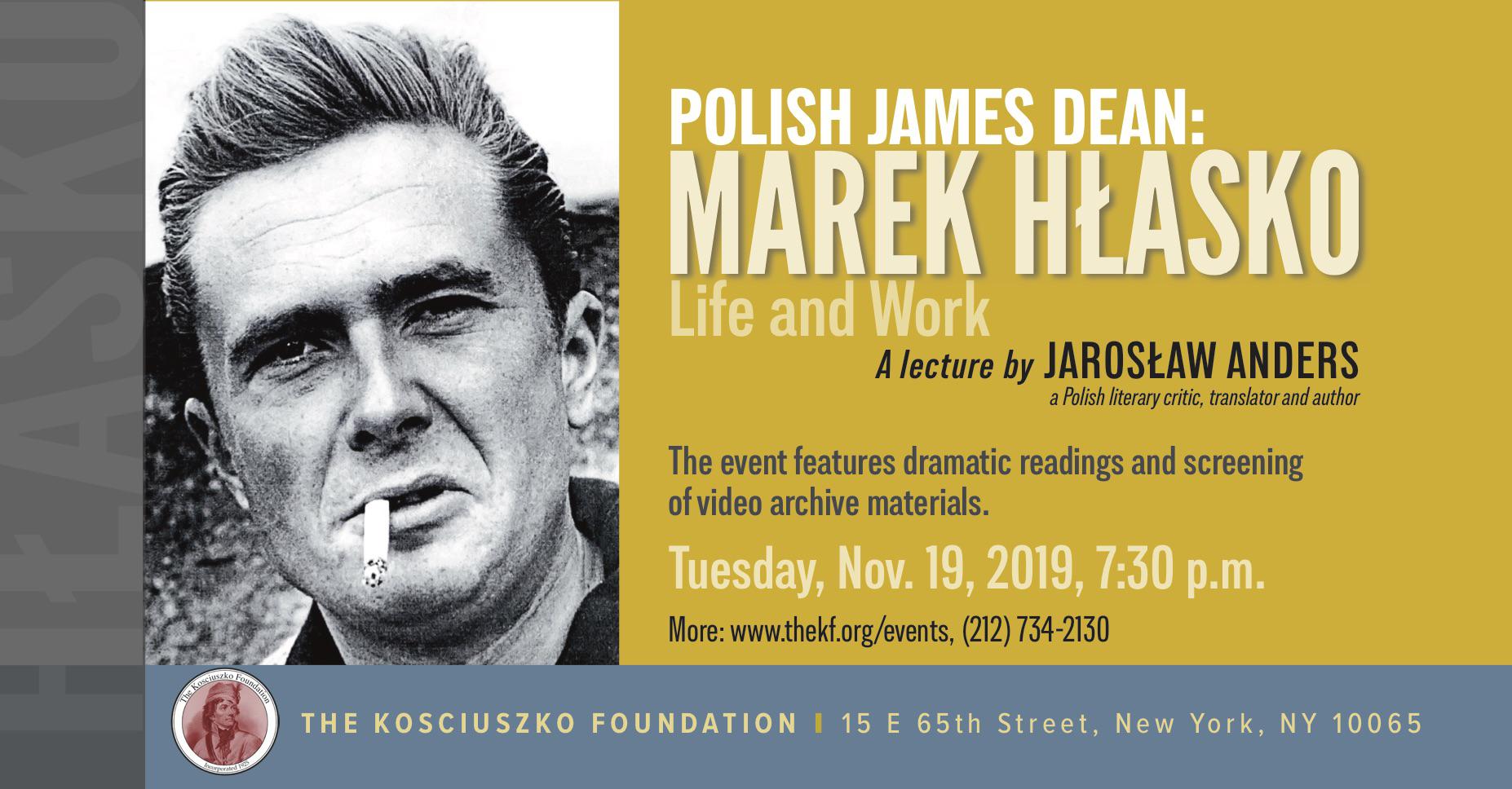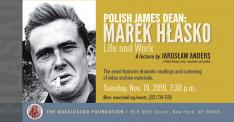
Past events
Polish James Dean: Marek Hlasko - Life and Work
Tuesday, November 19, 2019, at 7:30pm
The Kosciuszko Foundation welcomes Jarosław Anders, a Polish literary critic, translator and author to give a lecture on Marek Hlasko (1934 – 1969), one of the most influential Polish writers of the 20th century. Known as Polish James Dean, Hlasko became "the idol of Poland's young generation in 1956," (Czeslaw Milosz, 1980 Nobel Prize in literature). The talk presents Marek Hłasko's life and work as a reflection of one of the most turbulent and tragic periods in Polish literary history, and as a part of the larger canvas of global post-war culture. The event features dramatic reading from selected works by Marek Hlasko and screening of video archival materials.
Polish James Dean: Marek Hłasko - Life and Work
A lecture by Jarosław Anders
Tuesday, November 19, 2019, 7:30 p.m.
The Kosciuszko Foundation, 15 E 65th Street, New York, NY 10065
The event is presented as part of the Tadeusz Solowij Lectures of the KF.
Free and open to the public. Wine reception will follow the presentation. Space is limited. Registration required. First come first served.
In lieu of admission a $10 donation to the KF is appreciated.
Marek Hłasko, often described as "the Polish James Dean," was as complex and conflicted – in his writing as well as in his personal life -- as his alleged American analogue. Most of all, however, he was an icon and a spokesman of a Polish generation that witnessed the barbarity of World War II as children, and grew up in the menacing, suffocating atmosphere of Stalinism. It experienced a moment of hope and an unprecedented eruption of creativity in the mid 1950s and early 1960s, during the short period of political and cultural liberalization in Poland. Soon disappointed and stifled by returning restrictions, its talented members spent the rest of their lives looking for home – in the esthetic, ideological, as well as geographic sense. Like Hłasko, they were tough yet vulnerable, jaded yet romantic, self-confident and dynamic, yet often self-destructive. A truly lost generation among many beleaguered generations of Poles under the communist regime. They were radically different, and yet, sometimes, uncannily like their fellow rebels and seekers in America: the generations of James Dean, Jack Kerouac, Sam Peckinpath, and the Beat poets from California.
Marek Hlasko made his literary debut in 1956 with a short story collection. While in France, he fell out of favor with the Polish communist authorities, and was given a choice of returning home and renouncing some of his work, or staying abroad forever. He chose the latter, and spent the next decade living and writing in many countries, from France to West Germany to the United States to Israel. Hlasko died in 1969 of a fatal mixture of alcohol and sleeping pills in Wiesbaden, West Germany, preparing for another sojourn in Israel. Besides Killing the Second Dog, his translated works include the novels Eighth Day of the Week, All Backs Were Turned, Next Stop – Paradise, and The Graveyard, and a memoir, Beautiful Twentysomethings.
Jaroslaw Anders is a Polish literary critic, translator and editor living in Washington DC. He is the author of Between Fire and Sleep: Essays on Modern Polish Poetry and Prose (Yale, 2009), and many essays published in The New York Review of Books, The New Republic, The Los Angeles Book Review, and other publications. He translated into Polish books by Susan Sontag, and into English Barbarian in the Garden by Zbigniew Herbert, Rondo by Kazimierz Brandys, and The Subtenant by Hanna Krall.


